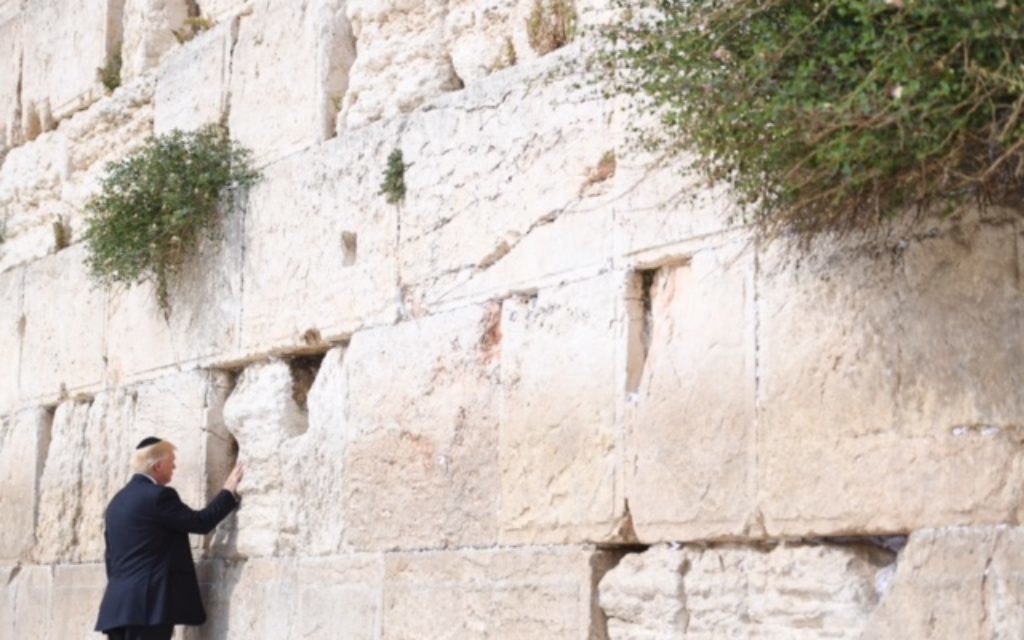Geffen: Trump Raises Hopes for a Peaceful Future
Amid conflicting responses in Israel, the president offers a vision for regional tranquility.
All the streets were closed because of the locales where President Donald Trump was going, so I stayed at home to watch the events of the second day of his visit.
Most Israelis had to go to work. That was the case with our children and their spouses. I hope that when they hear the words of the president, they will be moved to see a brighter future for their children.
Trump indicated that the Arab world is ready to destroy the terrorists, face with no fear the Iranian threat and help the Palestinians come to a peace agreement. Can Trump make it happen? We will have to see.
Get The AJT Newsletter by email and never miss our top stories Free Sign Up
He spoke glowingly about Jerusalem on the eve of Jerusalem Day. He emphasized how Israel makes it possible for all faiths to pray in their own way — in religious institutions Israel protects.
He talked about the dreams of Herzl to create a Jewish state with Jerusalem as its center. Trump emphasized that Jerusalem represents hope not only for the Jewish people, but also for all peoples and all faiths.
The commentators pointed out that Trump never talked about two states but emphasized that the Palestinians and the Israelis would have to work out the peace that would be best for both. Trump also never mentioned the settlements. As a result, the Likud ministers are already planning to build as much as they can in the West Bank.
At Yad Vashem it was moving after the Trumps lighted the eternal flame. You could see that Melania was crying. Trump spoke that favorite phrase: “The Jewish people will always have the support of the United States. We stress it will be never again that so many of yours are murdered.”
Trump was moved when he was given the notebook of a young woman who died in the Holocaust. After the war, her sister returned to their home, and a non-Jewish neighbor had preserved this treasure. Trump was given a special copy to take back to the White House.
The meeting of Trump with Mahmoud Abbas did not offer any breakthroughs. In his final address, Trump said again that the Palestinians and the Israelis were ready for peace. The world is waiting.
As an ordinary Israeli, it was nice from the start of the Trump visit to hear an American president speak so positively about Jerusalem and Israel.
A local writer who follows Prime Minister Benjamin Netanyahu wrote after the first day of the visit: “Israel needs a full-bodied hug to feel secure. It is also important that its enemies see that embrace.”
That journalist, an American here for 40 years, recognizes the insecurity that Israel feels even though the nation is almost 70 years old. In spite of winning numerous wars, in spite of developing some of the greatest high-tech breakthroughs, Israel as a nation, not Israelis, is ever seeking to receive public recognition. Without it, all the victories and discoveries are mere deeds.
On the other hand, another writer focused on the Trump embrace as just a way to suck Israel into his grand plans to bring about peace in this part of the world. Many American presidents have tried to get the Palestinians and Israelis together, but Trump knows he can do it. So, according to this writer, he puts on a grand show, bubbling over with praise for Netanyahu after bubbling over with praise for the king of Saudi Arabia and all the Arab leaders at the summit in Riyadh.
One of the great controversies of the Israeli writers on the two sides is what the visit to the Kotel meant for Israel, the Jewish people and his daughter Ivanka. Trump is the first American president to visit the Western Wall while in office.
His black kippah and the “black rabbi” who greeted him turned Trump into a grand supporter of Israel’s full rights to the Kotel. Television kept the world focused on Trump at the holiest site of our faith. Carefully placing notes in the Kotel meant that he was praying for the peace he hoped to bring about.
Ivanka was highly praised for her religiosity. She prayed in the women’s section dressed demurely with a fashionable hat. She was unaware that a TV camera always shows what is transpiring at the Kotel.
Thus, when she prayed and shed a tear, it meant that just as Jews have cried at the Western Wall through the centuries, Ivanka’s tears made her a legitimate member of Am Yisrael.
Writers on the other side of the spectrum saw Trump’s visit to the Kotel as a statement of what will happen. Trump would not permit Netanyahu or any other Israeli to be at the Kotel with him. If he wouldn’t let an Israeli join him then, the argument goes, how will he ever recognize East Jerusalem as part of Israel?
Trump wants a grand alliance of the Arab states, and that is much more important than accommodating Israel with the recognition of our holiest site and East Jerusalem as Israel’s current and eternal possession. This same writer suggested “that Trump went to the Kotel as a sign of his deep love for Ivanka’s commitment to Judaism.”
But Trump couldn’t miss the sight from his window at the King David Hotel that night of fireworks lighting up the sky for Jerusalem Day, a 50-year celebration to show the permanence of the results of the Six-Day War.
Rabbi David Geffen, a grandson of Rabbi Tobias Geffen’s and a former Atlantan, lives in Jerusalem.





comments